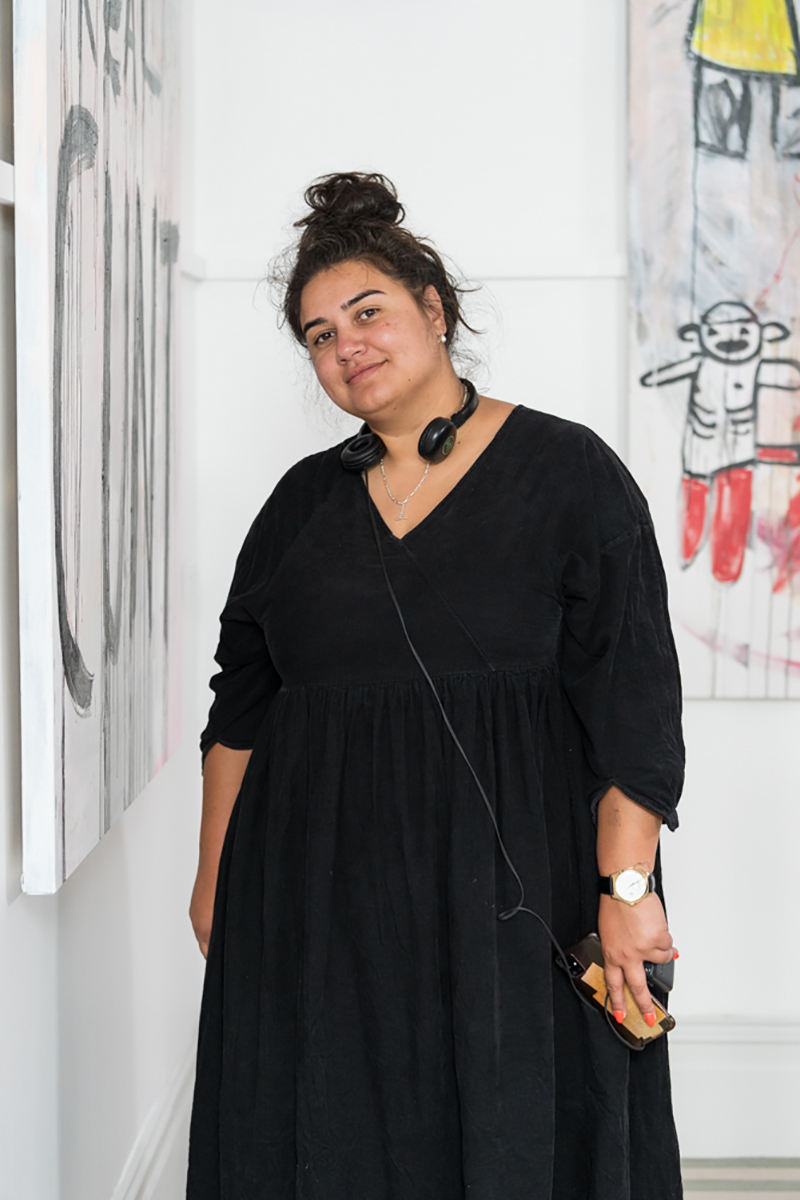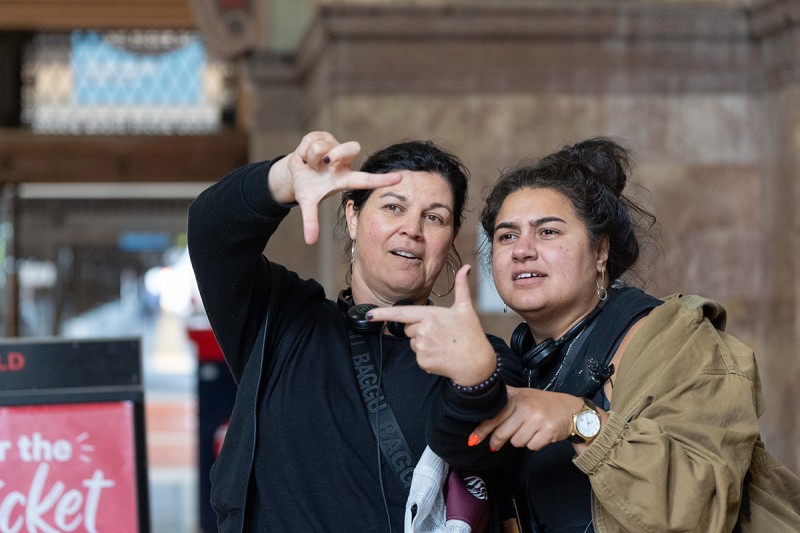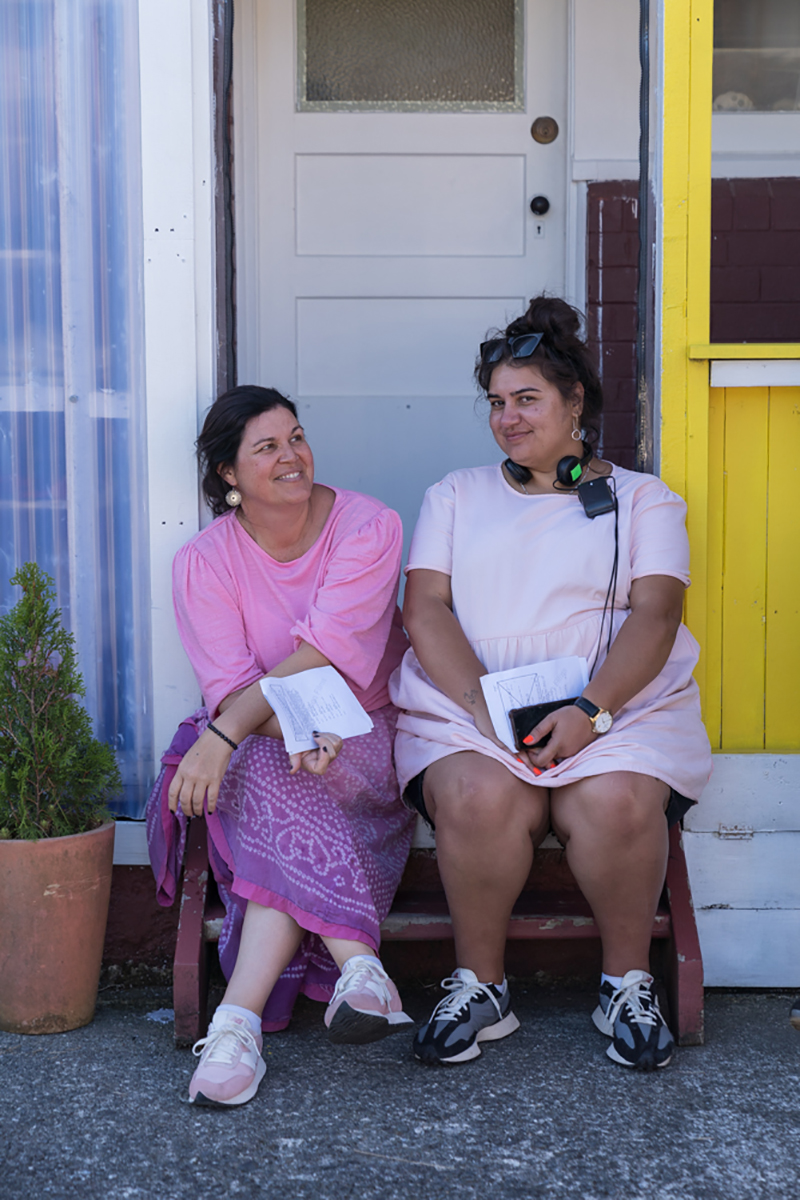
Photo by Rebecca McMillan Photography

Photo by Rebecca McMillan Photography

Photo by Rebecca McMillan Photography
Wellington Silver Screeners: Dana Leaming by Alessia Belsito-Riera
In our Wellington Silver Screeners series, Alessia Belsito-Riera shines a spotlight on the movers and shakers working in the film capital of New Zealand.
“It wasn’t until Not Even got picked up that I even thought of myself as being in the TV industry,” writer and director Dana Leaming tells me. Though she always wanted to tell stories, the path to where she is today wasn’t ever straightforward.
“I was teaching English in Japan and having a great time, but I would daydream at my desk and think about different stories that I wanted to write,” she says. When her daydreaming began to overshadow everything else, she figured it must be important to her. So, Leaming began her master’s at the International Institute of Modern Letters (IIML), but it wasn’t all sunshine and daisies from there. She still had a winding road ahead of her to get to where she is today: celebrating the release of season two of Not Even on Sky New Zealand and Neon. Read on to hear all about the ups, downs, and in-betweens.
It seems like your journey into the film industry wasn’t very straightforward. Can you talk me through the ride?
It’s a bit of a strange one. I didn’t go the traditional route at all, I skipped five million steps. After I did my master’s at the IIML, which is where Not Even originated, it got picked up slightly by a production company, but they looked at it and said no. So I had a bit of a minor breakdown. I was out for my friend’s 30th, and got a little bit too trolleyed and was drunk crying about how my writing career was over, to which my friend said, ‘Oh, I didn’t know you had a writing career’.
All of that went down and then I was working in NGOs quite happily. I mean, I didn’t love it love it, but it was a very fulfilling job. Then I got an email one day from someone saying they’d like to put my script forward for someone looking for new stuff. A week later I was on a Zoom with [producer] Ainsley Gardiner [MNZM], and it just snowballed from there. I don’t know what happened in the hour and half that me and Ainsley were on a Zoom call that made her think, ‘Yep, I’m gonna take a chance with this girl and I’m going to co-direct with her’. We spent the next two months putting together a pitch deck, got funding from New Zealand On Air in October, in December we had got the money, and in March we were in prep. I went from a random person in an NGO office to shooting a TV show in like six months.
What was that first experience on set like?
I was sh*tting myself.
But it went well, clearly, because you’ve now released the second season of the show! Can you tell me about Not Even?
Not Even is about four young Māori and one Pasifika who are running around Wellington in their early to late 20s trying to find themselves, but also doing a really bad job at it. They make bad decisions in hilarious ways. In season one it was: who am I and where am I? This time around, they’re getting older – and I always say every year in your 20s is like a whole different lifetime – so life is kicking them in the arse a little bit and they’re having to really think about who they are and what they want to do with their lives, and it doesn’t go well.
When you wrote the show, what was your intention with the story?
I think New Zealand tends to think of Māori in quite a homogenous way. That we all have a true, beautiful, deep connection with our whenua, with our whanaungatanga, and we all are enriched by our culture, which is definitely true, and I am for sure. But what I don’t think is necessarily shown is the disenfranchised and urbanised version of it, which is, at times, a lot more harrowing. Not Even is this version. As shown by the characters, we are still enriched by our culture, but the aftereffects of colonisation and how we experience the modern world have heavily influenced our connection to our culture. I hadn’t seen that on screen as authentically as it could have been in New Zealand. When I was younger, I would watch films and go for the person who looked the most like me, which was someone who was ethnically ambiguous. I would relate to that brown person in some way, but what I really wanted for myself was to relate through a Māori kid with the same emotions and feelings that I was going through. So that’s why I wrote it.
Would you say that’s why representation in media is so vital?
I think accurate, authentic representation is important, because I do think that there are situations where people just plonk a diverse person into a show and think that’s as much as they need to do. Every character should be given their due diligence, their complexities, their nuances, regardless of genre. What I think is important is portraying an interesting character that is intelligent, complicated, irrational, fun, joyous, all these different things, and also Māori, or Pasifika, or anything else. I would like to see characters that have those layers to them. And I think for Māori, there’s such a spectrum of us that exists, yet we only really have two or three versions [on screen], while our Pākēha counterparts have 10.
I also think we need more Māori villains. My favourite characters are villains. [Scar from The Lion King] had this whole swag, he was charismatic, and he was complicated. Why can’t Māori be villains? I know why, it’s more complicated than chucking them in the villain role, because we have been stigmatised. Anything that represents Māori as being violent, aggressive, or evil is not something that we want for our people, because we have been considered that for so long in any mainstream media way. For Māori, I really have to consider how I will stigmatise them even more, and I don’t want to do that, so I have to keep that in the back of my head when I write. But then I think about how my Pākehā counterparts don’t have to do that with their characters.
Hopefully, with shows like Not Even that have more authentic representation, this will begin to change.
Yeah, I think it’s funny because the way the world is currently feels like we’re getting even more fickle. I worry about where we’re going to land with that. I do want to give credit to the viewer. I think audiences are getting smarter. There are some cooked shows coming out where you’re watching characters do some really bad sh*t yet you’re still relating to them. There’s hope, it’ll just take time.
Shifting gears, as a Wellingtonian, was making the show about and in the capital crucial?
It had to be in Wellington. I wrote it to be in Wellington and about my time [here]. It’s actually really hard to represent a city in a show, in the sense of making [it] its own little character. I’ve been here for 15 years now. I moved down when I was 19 and I love it. As much as Tauranga raised me as a kid, Wellington raised me as an adult. It is very much a love letter to this unhinged little city.
Will there be a season three, or alternatively, what’s next for you?
I really don’t know at this point. I think for the characters there’s definitely room for more story, but who knows with the current way media is going. Even if there wasn’t a season three, I’m really proud of the second season. I think people will be really satisfied with it, and I think it’s a little bit more mature than season one – as much as I can be mature, like, I still laugh at the idea of butts and stuff.
I’m working on a number of things. I am trying to write another show and possibly get that into development. I’m working as a full-time writer, but from home, which is going for walks midway through the day, trying to make friends with the neighbourhood cats, and trying to figure out how to write things. So right now, my days feel really strange.
What advice would you give somebody who is trying to get into the film industry?
It’s a little cynical, but sometimes it is who you know and luck that will get you a foot in the door. But once your foot is in the door, you should work really, really, really hard. Whatever you want to do, someone believing in you and giving you a shot is important. Know what your strength and your weakness is, play on those things, and shoot your shot when you can. Put yourself forwards – you have to show what you’ve got. I think you have to be a little bit obsessed with your craft. That obsession pushes you through, to stand out, and to be really good at what you do. It’s in your bones at that point.
View more articles from:
« Issue 235, January 14, 2025

